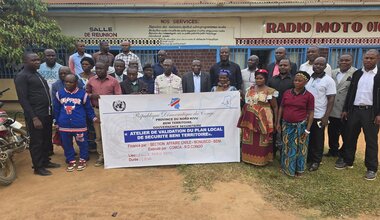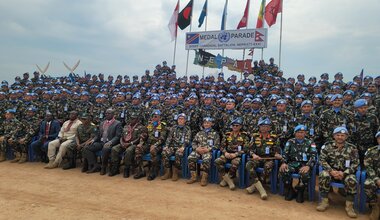MONUSCO holds innovative combined training, retreat for 104 Civil Affairs staff
Kinshasa, 19 November 2010 - The Civil Affairs Section in MONUSCO – the UN Stabilization Mission in the Democratic Republic of the Congo (DRC) – successfully piloted an exciting new training programme within the context of its annual retreat in Entebbe, Uganda, at the end of October.
The new Department of Peacekeeping Operations (DPKO) methodology for training Civil Affairs components focuses on training the team as a whole, in-context, on the skills that they need for the implementation of their workplan for that year. It is the fourth mission that has piloted the new approach so far, but this event was a first for how it ran in parallel and as a complement to the Civil Affairs retreat programme.
The experience was also unique given the numbers involved –104 national and international Civil Affairs staff from across the DRC availed themselves of the training, conducted in both French and English. In essence, the training honed analysis, planning and communication skills that could be called upon across the entire spectrum of civil affairs work, using case studies and examples from their work on the ground in DRC. Staff engaged in participatory working-group exercises designed to challenge the way they worked, and how they thought about their work.
Given the particular geographical spread involved with Civil Affairs staff in the DRC, participants were able to share diverse and varying experiences from the field, which served to optimize a sense of mutual learning for everybody. But the real value of integrating the training – which was conducted during the first half of four days – was that Civil Affairs staff were able to carry over and consider issues raised during the retreat agenda into the more interactive context of the training – and vice-versa.
As for the retreat programme itself, UN Country Team (UNCT) and NGO partners, a representative from Civil Affairs team at DPKO HQ, and the MONUSCO DSRSG, Fidele Sarassoro, joined the DRC staff in taking stock of the year's progress and charting a way forward by way of the Civil Affairs Work Plan 2010-11.
Twenty-five key recommendations came out of the retreat discussions, in the areas of protection of civilians, conflict management, civil society and peace consolidation.
Joanna Harvey from the Civil Affairs Team at DPKO HQ gave MONUSCO Civil Affairs staff an overview of the section's reach worldwide. Since its creation in the Balkans in the mid-1990s, the Civil Affairs Section (CAS) has grown to become the DPKO component with the most extensive presence at local level, with three-quarters of the more than 500 CAS officers based in the field, supporting peacebuilding efforts at the local level. The scope and parameters of Civil Affairs work globally is a continually evolving process that is undergoing refinement all the time, but one that has been aided firstly by the drafting of a Civil Affairs Policy Directive in 2008 and by the establishment of the Civil Affairs Network, a forum allowing Civil Affairs staff in all missions to share information and seek guidance on better civil affairs practice. A Civil Affairs Handbook will also be published in the near future.
For his part, Mr. Sarassoro reminded his audience of the lead role CAS was playing at the forefront of MONUSCO's protection and stabilization efforts in the DRC. He told MONUSCO/CAS and its acting OIC, Laurent Guepin, that the section could be proud of its work over the past year, particularly regarding its expanded protection activities, recruitment of community liaison interpreters, conflict-mapping exercises, its partnership with the UNDP in vital stabilization projects in eastern DRC, and its continued support in bringing civil society to the centre of the democratic-reform process in the DRC.
Mr. Sarassoro also gave his endorsement to the MONUSCO CAS Work Plan 2010-11, which he said was in line with SC Resolution 1925 (approved last May). He said that at a time when there had never been more pressure on MONUSCO and on CAS to perform, he looked forward to seeing the proposals arising from the retreat being implemented on the ground, and CAS work serving to strengthening partnerships with the Congolese government and the UNCT, thereby laying the foundations for a smooth handover in the future.
 UN
UN United Nations Peacekeeping
United Nations Peacekeeping






